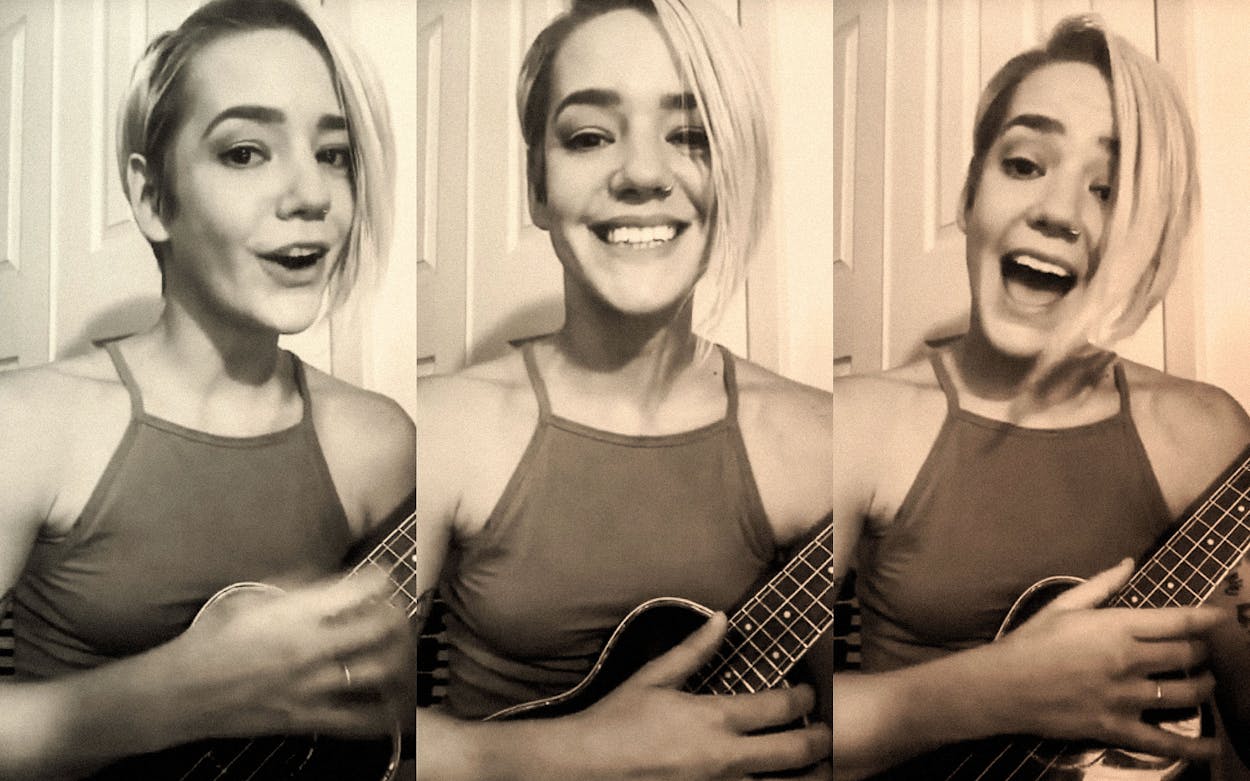The Brett Kavanaugh Supreme Court confirmation hearings turned into a referendum on the #MeToo movement, but that was an inevitable pivot. In 1991—the same year that the last Supreme Court justice publicly accused of sexual misconduct was confirmed to the court—author Susan Faludi’s bestseller Backlash explained how advances in women’s rights are typically followed by a wave of opposition. So when President Trump responded to the allegations against Kavanaugh by declaring, “It’s a very scary time for young men in America,” the 2018 remix of the phenomenon marched on.
Lynzy Lab, a performance artist from Houston who lives in San Marcos, scored herself a viral hit this week with her response to Trump’s statement, a simple ukulele number called “A Scary Time.” The video, which she uploaded to YouTube, is a decidedly lo-fi production. Lab performs the song live in a single take, and doesn’t even position the camera horizontally. But punk rock taught us that production values can sometimes get in the way of the message, and Lab definitely has something to say.
The song outlines what she says constitutes scary situations for women versus what young men are currently facing. Lab’s lyrics detail casual no-no’s for women like being able to go out alone at night, leaving a window open while you’re at home, or going jogging while wearing headphones. Most of the reasons that she outlines as scary for men, meanwhile, involve acting decently toward women. It’s a not so subtle clap back at the assertion that false allegations have run rampant.
False allegations of sexual assault are rare—a 2010 peer-reviewed study found that, of sexual assault charges made to police, the number that are proven false are between 2 and 10 percent, a statistic that does not include unreported allegations, which experts estimate make up anywhere between 80 to 95 percent of incidents. The point Lab makes in her song is backed up, then, by simple math: Even using the generous end of those estimates, if 1,000 sexual assaults occur, only 200 of them would be reported to police. Of those, 20 might be false. Which means that two out of every 100 allegations, regardless of who they’re reported to, might be false.
But numbers aren’t the reason Lab’s song went viral, and it’s not why Trump insisted that it’s a “scary time” for young men right now. The backlash against #MeToo that’s occurred in the wake of the Kavanaugh hearing isn’t really about the likelihood of men being falsely accused of sexual assault—it’s about tapping into the fact that it is technically possible that any allegation could be one of the 2 percent (or less) that are false. That’s a signal that a woman on Twitter, who shared a photo of her son in his Navy dress whites, picked up the same day that Lab’s song blew up online. In her tweet, she declared that her son, “a gentleman who respects women,” no longer goes “on solo dates due to the current climate of false sexual accusations by radical feminists with an axe to grind.”
That last part, as it turns out, wasn’t true. Pieter Hanson, the 32-year-old former serviceman in the photograph, created his own Twitter account to set the record straight.
That was my Mom. Sometimes the people we love do things that hurt us without realizing it. Let’s turn this around. I respect and #BelieveWomen . I never have and never will support #HimToo . I’m a proud Navy vet, Cat Dad and Ally. Also, Twitter, your meme game is on point. pic.twitter.com/yZFkEjyB6L
— Pieter Hanson (@Thatwasmymom) October 9, 2018
That mother-son mixup concisely demonstrates what Lab’s song expresses so effectively. No one needs to post a fake photo of their daughter claiming that the world is suddenly conspiring against her because she can’t leave her drink unattended at a party, because everyone already knows that’s dangerous, tangible, mundane, and everywhere.








